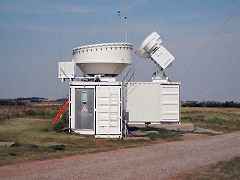Ka-Band ARM Zenith Radar (KAZR)
Description of the radar set, tactical-technical characteristics

Figure 1: KAZR installation at SGP (foreground) with SACR (background)
(36°36'19.1" N 97°29'10.7" W)
| Specifications | |
|---|---|
| frequency: | 34.83 - 34.69 GHz ( Ka-band) |
| pulse repetition time (PRT): | |
| pulse repetition frequency (PRF): | max.: 20 kHz |
| pulsewidth (τ): | 100 ns – 20 μs |
| peak power: | 2 kW |
| average power: | |
| instrumented range: | |
| range resolution: | |
| beamwidth: | 0.2 or 0.3° |
| MTBCF: | |
| MTTR: | |
Ka-Band ARM Zenith Radar (KAZR)
The Ka-band ARM zenith radar (KAZR) is a zenith-pointing Doppler cloud radar operating at approximately 35 GHz. The KAZR is an evolutionary follow-on radar to ARM’s widely successful millimeter-wavelength cloud radar (MMCR). The main purpose of the KAZR is to provide vertical profiles of clouds by measuring the first three Doppler moments: reflectivity, radial Doppler velocity, and spectra width. At the sites where the dual-polarization measurements are made, the Doppler moments for the cross-polarization channel are also available. In addition to the moments, velocity spectra are also continuously recorded for each range gate.
The Transmitter uses a Traveling Wave Tube amplifier. The antenna type is a Cassegrain parabolic reflector with a diameter of either 3 m or 2 m.
Source:
- K. Widener, N. Bharadwaj, K. Johnson: “Ka-Band ARM Zenith Radar”, DOE/SC-ARM/TR-106, February 2012 (online)


